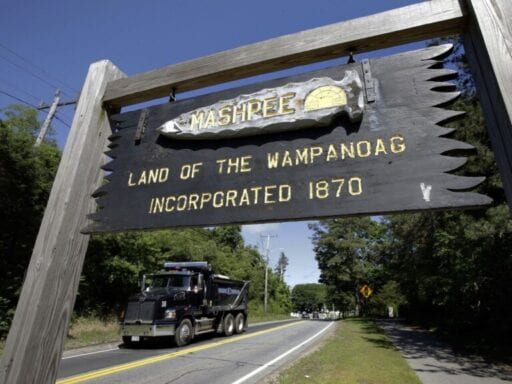The tribe’s 321 acres of land has been ordered taken out of federal trust.
While Indian Country was responding to the growing number of coronavirus cases in its communities late Friday, the Trump administration was busy revoking the reservation status of the Mashpee Wampanoag tribe in Massachusetts. By taking their 321 acres of land out of federal trust, the Interior Department’s order also removes the tribe’s ability to govern on its land. This process has been done only one other time since the Termination Policy in the 1950s.
While reservation lands are often associated with Indian tribes’ unique ability to oversee casinos, maintaining trust land also allows them to provide critical services to their members. “Our land is sacred. It’s where our people receive health services. It’s where our children attend our language immersion school … Taking our land is a direct attack on our culture and our way of living,” Mashpee Wampanoag chair Cedric Cromwell said after the decision.
The move by the Interior Department comes at a precarious time, as reservations shut down amid the Covid-19 pandemic. It could also signal what’s to come for other tribes.
“The action by this administration in rendering such a decision is dishonorable and reprehensible on its face, but to do so when we are fighting a national pandemic is shameful,” President Kirk Francis of the nonprofit United South and Eastern Tribes’ Sovereignty Protection Fund said in a statement. “If there was any question before, it is clear that we are experiencing a crisis in Indian Country at this moment.”
How the Mashpee Wampanoag lost their reservation status
The Interior Department’s order is based on an appeals court decision last month that said the Mashpee Wampanoag — whose land the pilgrims settled on — could not have land taken into trust in the first place. They were not under federal jurisdiction in 1934 when the Indian Reorganization Act, which created the concept of trust land, was signed.
However, this appeals court decision was based on a controversial, and confusing, Supreme Court ruling, Carcieri v. Salazar in 2009. “[Carcieri] creates two classes of tribes in the United States, some that can have land in trust and some that cannot,” Kevin Washburn, dean of the University of Iowa College of Law, and citizen of the Chickasaw Nation, told Vox.
The Carcieri ruling left a number of big questions unanswered in Indian Country. While the Court created two classes of tribes, it did not provide an understanding of how to decide between the two.
The Obama administration tried to end this uncertainty about which tribes can put land into trust by creating a framework to interpret the ruling. Notably, this framework is what allowed the Mashpee Wampanoag reservation to be placed into trust in 2015.
But the Trump administration has not utilized these guidelines, reinterpreting that original decision more broadly. The Interior Department even went so far as to issue a new ruling in 2018 saying that the Bureau of Indian Affairs, under the Interior, did not consider Mashpee Wampanoag to be under federal jurisdiction in 1934, reversing the Obama-era policy. This has led the tribe to bring new litigation against the Interior in federal court, which is still pending.
Under these new interpretations during the Trump administration, other tribes are worried about the possible ramifications for their own lands. “There are some tribes that would not meet the Carcieri requirements, if you view [them] broadly, so there are presumably some tribes that cannot have land taken into trust, except by Congress,” said Washburn.
As Washburn acknowledges, tribes can have land taken into trust by acts of Congress. The Mashpee Wampanoag tribe has also pursued this route. Last May, the House of Representatives, in a bipartisan vote, approved two companion bills, H.R. 312, the Mashpee Wampanoag Tribe Reservation Reaffirmation Act, and H.R. 375, amending legislation to “fix” the Carcieri decision. However, before a similar bill could be taken up in the Senate, President Trump told congressional Republicans not to vote in favor of H.R. 312. On its reservation land, Mashpee Wampanoag was developing a casino that was opposed by allies of Trump who were lobbying for nearby casinos in Rhode Island.
In all, this leaves Indian tribes in a tough position. Today, tribes struggle to maintain less than five percent of all lands in the United States before European contact. Yet, the two main ways to increase their land holdings, through Congress and the Interior Department, remain blocked by the Trump administration.
Massachusetts Sens. Elizabeth Warren and Ed Markey said they will fight against the administration’s decision. “The Mashpee Wampanoag have a right to their ancestral homeland no matter what craven political games the Trump administration tries to play,” the Democratic senators said in a joint statement on Sunday. “Disestablishment of the Mashpee Wampanoag reservation would re-open a shameful and painful chapter of American history of systematically ripping apart tribal lands and breaking the federal government’s word. We will not allow the Mashpee Wampanoag to lose their homeland.”
For tribes, advocating for the return of their lands is key to their survival. “These are our lands, these are the lands of our ancestors,” Cromwell said, “and these will be the lands of our grandchildren.”
Author: Rory Taylor
Read More



